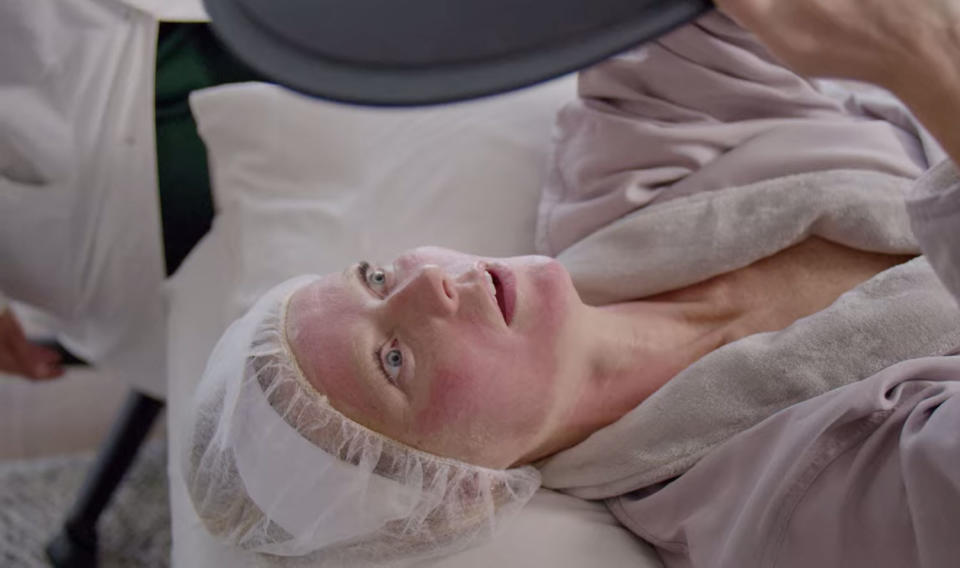'The Goop Lab' and other controversial documentaries: Why Netflix is facing criticism for promoting 'pseudoscience'

Netflix is stirring up controversy by giving Gwyneth Paltrow a platform to share what several critics are calling “pseudoscience” with her new show, The Goop Lab, which debuted this week.
The show, which Netflix files under “provocative” and “quirky,” is described as the following: “Leading with curiosity, Gwyneth Paltrow and her goop team look at psychedelics, energy work and other challenging wellness topics.”
The topics being tackled in the series range from “energy healing,” “psychic mediums” and orgasm workshops to taking psychedelics as a form of therapy and plunging into freezing water to stimulate the immune system.
Along with the Daily Beast calling the show “a nightmare,” Time writer Judy Berman writes: “As with the brand itself, what’s disturbing about the show is that when you combine Gwyneth’s aura of trustworthiness with a mishmash of real science, New Age nonsense, vague female empowerment rhetoric, naked commercialism and some startling knowledge gaps in areas where Goop claims expertise, the result has its unique dangers.”
Related Video: Gwyneth Paltrow’s ‘The Goop Lab’: Fact-Checking the Health Claims
It’s not all ‘pseudoscience’
But in the show’s defense, some of the featured wellness practices are supported by science. In one episode, for example, it appears that Paltrow is getting a PRP, or platelet-rich plasma, facial (what some call a “vampire facial,” which is a trademarked term) — an anti-aging treatment that’s popular with celebrities.
With the facial, “venous blood is taken from the patient and separated into the cellular component and the plasma component,” Nava Greenfield, MD, of Schweiger Dermatology Group in New York City, explains to Yahoo Lifestyle. “The plasma is then injected or topically applied back to the patient in specific locations. It can be used for hair loss, or in combination with microneedling for the face. Microneedling is a popular procedure where tiny needles are used to induce a specific kind of injury to the first and second layer of skin, promoting collagen synthesis. When used in combination with PRP, superior results are often obtained.”
Although it may sound “out there,” the facial stimulates the production of collagen to help “tighten, smooth, and improve skin tone,” according to the Cleveland Clinic. As with any injection, the treatment does carry a small risk of bleeding, pain or infection, but is considered safe.
In another episode, people — really, Goop’s employees who have volunteered to try these experimental wellness treatments — take psychedelic drugs, leaving one employee sobbing on the floor and then later saying, “I went through years of therapy in about five hours.”
David Spiegel, MD, director of the Stanford Center for Integrative Medicine, tells Yahoo Lifestyle that there’s actually some interesting research on the psychotherapeutic effects of psychedelics (such as MDMA and “magic” mushrooms), with one 2018 National Institutes of Health study calling the therapy “potentially life-preserving.” “Some clinical trials are showing it helps with post-traumatic stress disorder and depression in people nearing the end of life,” he says. “It can help people come to terms with impending death.”
But Spiegel emphasizes that psychedelic drugs need to be used in a controlled setting and in combination with psychotherapy for these mental health benefits.

No shortage of vocal critics
Still, plenty criticize The Goop Lab (or really, anything Goop or Gwyneth Paltrow-related, for that matter), and question the legitimacy and safety of some of the practices in the series, pointing out the lack of objective experts. But while many may view the decision as an oversight, Elise Loehnen, chief content officer at Goop and executive producer of The Goop Lab, suggested to Fast Company that it was deliberate: “We felt like we would be manufacturing drama by trying to find a detractor.”
Timothy Caulfield, research chair in health law and policy and professor in the Faculty of Law and School of Public Health at the University of Alberta in Canada has been vocal about his criticism of The Goop Lab, writing on Twitter that the series is “an infomercial for [Paltrow’s] pseudoscience business” — a business worth an estimated $250 million.
“The topics covered are classic wellness woo: a mashup of the supernatural, spiritual and science-y,” Caulfield tells Yahoo Lifestyle. “Some topics, like the cold therapy, use the familiar strategy of a powerful testimonial — the 'inventor’ Wim Hof — with an extreme experience — cold! — and a dash of scientific speculation to make it seem credible.”
Spiegel is also wary of the series, telling Yahoo Lifestyle: “Goop is her company so it’s an infomercial, basically. She’s a great actress, but that doesn't make her an expert on these so-called treatments. It’s fine to explore things as long as you don’t pretend your exploration is more than what it is. I don’t like the pretense of it being a scientific examination.”
Several other doctors, most notably Jennifer Gunter, MD, have repeatedly called out Paltrow and Goop in the past for what Business Insider calls “scientifically indefensible” and potentially harmful health information and products, including the now-famous jade and rose quartz vaginal eggs. Goop claimed the stone eggs provided health benefits when inserted vaginally — namely, “balance their hormones, regulate menstrual cycles, prevent uterine prolapse and increase bladder control,” according to the Los Angeles Times. But after a lawsuit was filed by 10 state prosecutors in California over advertisements “not backed by competent and reliable scientific evidence,” the company ended up paying $145,000 in civil penalties. (Jade eggs, $66, are currently unavailable on the site.)
“Goop has some fine advice, for example, [in] an article on sleep on their site,” Gunter said in a statement provided to Yahoo Lifestyle. “They also distribute some dangerous advice, for example drinking goats milk to treat parasites (the parasites are non-existent). When good information is next to harmful and presented in the same way, how can people distinguish? In addition, they sell useless and potentially harmful products, such as supplements.”
Gunter continued: “Finally, they have used their international platform to advance harmful ideas, many of which are medical conspiracy theories. For example, bras cause breast cancer (they don't), fears about vaccine safety and concerns about fluoride,” adding, “The supplements are not supported by science. At all. The idea that a medium can help with health is as anti-science as one can be; it is the definition of snake oil. So you'll have to ask Goop for the science behind their myriad of false claims.”
‘The spreading of misinformation can have a real impact’
Critics are concerned that those misleading claims will now have an even bigger platform on The Goop Lab, with Netflix’s 167 million subscribers worldwide. Ars Technica’s Beth Mole writes that, on the show, Paltrow’s “ignorance and lack of critical thinking skills are on full display as a parade of questionable ‘experts’” — with the noted exception of sex educator Betty Dodson, PhD — “and ridiculous claims about health and science march across the small screen unchallenged.”
Caulfield tells Yahoo Lifestyle, “The spreading of misinformation can have a real impact. Just being exposed to this nonsense can make it seem more plausible, especially if it is packaged in a memorable manner.”
He adds, “I also think that a show like this adds more noise to an already confused health information environment. In this age of misinformation, it is disappointing to see an entity like Goop, which has a long history of profiting from misinformation, have the opportunity to push more pseudoscience. We shouldn't forget that Goop and Gwyneth benefit financially from the growth of their brand, which is what this show does. It is an infomercial for Goop, not an independent science-informed documentary.”
Netflix and controversy
Critics have also called out Netflix, saying this isn’t the first time the streaming service has created controversy with its health documentaries. As HuffPost U.K. (HuffPost U.K. and Yahoo are owned by the same parent company, Verizon Media) put it: The streaming service “has a history of producing irresponsible health programs that could potentially affect viewers.”
In 2019, RealClearScience.com posted a list of multiple shows that have aired on Netflix, which the publication dubbed “anti-science documentaries,” while the American Council on Science and Health shared their own list back in 2017. The documentaries called out include What the Health, Cowspiracy and The Magic Pill.
In What the Health, Vox wrote that the film “cherry-picks studies about nutrition and often exaggerates their findings or reports them out of context, to drive home his case for veganism” and “cranks the food fear sirens to irresponsibly high levels,” such as claiming that “eating processed meats is as bad for you as smoking.”
As Vox points out, there’s “a causal link between eating processed meat and certain types of cancer in humans, chiefly colorectal cancer. But the actual risk is quite modest — and far, far smaller than the cancer risks from smoking.” According to the World Health Organization, “processed meat has been classified in the same category as causes of cancer such as tobacco smoking and asbestos... but this does NOT mean that they are all equally dangerous.”
In The Magic Pill, Australian chef Pete Evans claims that the popular keto diet can treat type 2 diabetes, cancer and autism. Michael Gannon, then president of the Australian Medical Association (AMA), called The Magic Pill “hurtful, harmful and mean” and compared it to the controversial film, Vaxxed, telling the West Australian in 2017 that both films were competing “in the awards for the films least likely to contribute to public health.”
In 2018, the current AMA president, Tony Bartone, MD, shared his own opinion about The Magic Pill, telling the Sydney Morning Herald: “All forms of media have to take a responsible attitude when trying to spread a message of wellness. Netflix should do the responsible thing. They shouldn't screen it. The risk of misinformation... is too great.”
While noting that Netflix has “some incredible documentaries,” HuffPost’s Todd Van Luling (HuffPost and Yahoo are owned by the same parent company, Verizon Media) writes that many of the documentaries the streaming service adds each month “make dubious claims that wouldn’t withstand scrutiny from a fact-checker.”
But in at least one case, Netflix appears to have listened to critics by pulling the documentary, Root Cause, in March 2019, which came under fire after several medical organizations, including the American Dental Association, said the film “falsely links the root canal procedure to breast cancer and heart disease, employing baseless claims gleaned from discredited 1920s research,” according to the Philadelphia Inquirer.
Yahoo Lifestyle reached out to Netflix for comment but has not yet heard back.
Read more from Yahoo Lifestyle:
Gwyneth Paltrow talks MDMA trip, body image and aging: What we learned about the Goop founder
U.S. has its first confirmed case of the coronavirus — here’s what you need to know
This is the age people find the most meaning in their lives, study shows
Follow us on Instagram, Facebook and Twitter for nonstop inspiration delivered fresh to your feed, every day.


